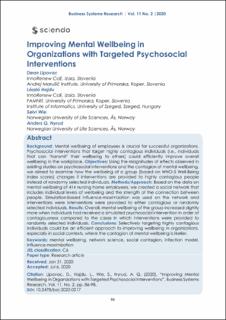| dc.contributor.author | Lipovac, Dean | |
| dc.contributor.author | Hajdu, Laszlo | |
| dc.contributor.author | Wie, Sølvi Therese Strømmen | |
| dc.contributor.author | Nyrud, Anders Q. | |
| dc.date.accessioned | 2021-02-05T14:37:16Z | |
| dc.date.available | 2021-02-05T14:37:16Z | |
| dc.date.created | 2021-02-01T00:22:10Z | |
| dc.date.issued | 2020 | |
| dc.identifier.citation | International Journal of Business and Systems Research. 2020, 11(2), 86-98 | en_US |
| dc.identifier.issn | 1751-200X | |
| dc.identifier.uri | https://hdl.handle.net/11250/2726480 | |
| dc.description.abstract | Background: Mental wellbeing of employees is crucial for successful organizations. Psychosocial interventions that target highly contagious individuals (i.e., individuals that can ‘transmit’ their wellbeing to others) could efficiently improve overall wellbeing in the workplace. Objectives: Using the magnitudes of effects observed in existing studies on psychosocial interventions and the contagion of mental wellbeing, we aimed to examine how the wellbeing of a group (based on WHO-5 Well-Being Index scores) changes if interventions are provided to highly contagious people instead of randomly selected individuals. Methods/Approach: Based on the data on mental wellbeing of 414 nursing home employees, we created a social network that includes individual levels of wellbeing and the strength of the connection between people. Simulation-based influence-maximization was used on the network and interventions were interventions were provided to either contagious or randomly selected individuals. Results: Overall, mental wellbeing of the group increased slightly more when individuals had received a simulated psychosocial intervention in order of contagiousness compared to the cases in which interventions were provided to randomly selected individuals. Conclusions: Selectively targeting highly contagious individuals could be an efficient approach to improving wellbeing in organizations, especially in social contexts, where the contagion of mental wellbeing is likelier. | en_US |
| dc.language.iso | eng | en_US |
| dc.relation.uri | https://content.sciendo.com/configurable/contentpage/journals$002fbsrj$002f11$002f2$002farticle-p86.xml | |
| dc.rights | Attribution-NonCommercial-NoDerivatives 4.0 Internasjonal | * |
| dc.rights.uri | http://creativecommons.org/licenses/by-nc-nd/4.0/deed.no | * |
| dc.title | Improving mental wellbeing in organizations with targeted psychosocial interventions | en_US |
| dc.type | Peer reviewed | en_US |
| dc.type | Journal article | en_US |
| dc.description.version | publishedVersion | en_US |
| dc.source.pagenumber | 86-98 | en_US |
| dc.source.volume | 11 | en_US |
| dc.source.journal | International Journal of Business and Systems Research | en_US |
| dc.source.issue | 2 | en_US |
| dc.identifier.doi | 10.2478/bsrj-2020-0017 | |
| dc.identifier.cristin | 1884646 | |
| dc.relation.project | EC/H2020/739574 | en_US |
| cristin.ispublished | true | |
| cristin.fulltext | original | |
| cristin.qualitycode | 1 | |

